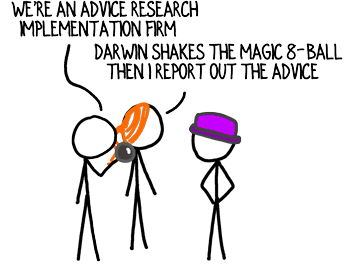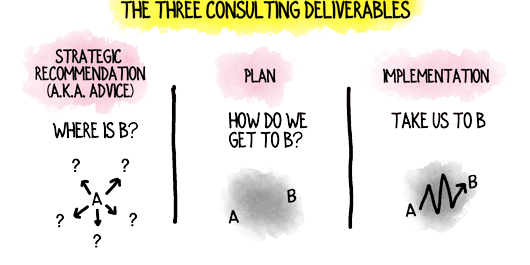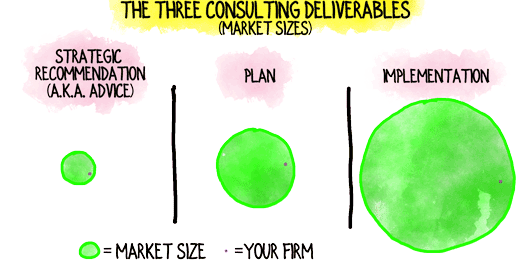Which is Better for Your Consulting Firm: Giving Advice or Implementing?
Over the long term, is your consulting firm better off contracting with clients to deliver advice or digging into nuts-and-bolts implementation assignments? The answer may surprise you.

As a consulting firm leader, important strategic decisions rely on your wisdom. You’re familiar with many of these important, sometimes confusing crossroads, such as…
Should your firm focus on advisory engagements or implementation projects? Bill by the hour, charge value-based fees or sing karaoke for tips? Serve pinot noir at the holiday party or small bites of Roquefort?
There are pros and cons to each choice.
For instance, clients allocate far more budget to implementation than to strategy. That’s why the largest professional service firms in the world are all implementation-focused and those firms are at least ten times the size of even the most prestigious, well-known strategy firms.

In addition, implementation projects are often longer—occasionally years in duration, and implementation is more easily scaled than is advisory work.
Advice-focused consulting firms, in contrast, can typically command much higher margins and are less susceptible to commoditization. Also, because strategy consulting is often viewed as sexier than implementation, advisory firms may attract the “best and brightest” employees away from implementation consultancies.
Given the benefits and drawbacks to each side of consulting, is it better to focus your consulting firm on winning advisory engagements or on implementation projects?
Yes.
Your consulting firm will fare best if you choose one of those avenues (or, the oft-forgotten middle road: developing implementation plans).
It doesn’t really matter which one you choose.
There is so much consulting work available and so many ways to build a profitable, successful consulting firm, that you don’t need to introduce false choices and unnecessary stress.

If you’re like most readers of these articles, your firm is under $100M and you’re swimming in a sea of opportunity. Whether or not your firm is currently struggling to land projects, there is a lot of consulting business being signed right now.
You’re in a huge, stocked wine cellar with rack upon rack of pinot noir and, as it turns out, a massive spread of Roquefort in the middle. Just choose one and enjoy!
Combining the two, though… not a good idea.
You may have been thinking, “C’mon, David. My firm can—and does—advisory work and implementation. Can’t we enjoy the best of both worlds?”
No. At least, mostly no.
Your consulting firm undoubtedly mixes at least a thimbleful of advice and implementation into every engagement. In a “strictly advisory” relationship, you may sneak in a bit of implementation by drafting a document for your client or managing governance of an initiative.
Conversely, if your consulting firm has been hired for a purely implementation role such as running a training session, developing a communication campaign or project-managing a major initiative, you’ll contribute off-the-cuff advice and possibly develop a plan.
A little bit of overlap—say 20%, works well.
However, building your consulting firm into a practice that delivers “end-to-end” services is a bad idea.
Advisory-focused consulting firms and implementation-focused consulting firms require very different delivery skill sets, organization designs, pricing structures, compensation plans, and management philosophies, just to name a few areas where the two types of firms differ from each other.
Therefore, rather than fretting over whether your consulting firm should operate on the advice or implementation side of consulting, focus your (or your leadership team’s) attention on the following two questions at least twice every year:
Two Questions to Answer Semi-Annually
Are We Right-Side Up?
Are my firm’s offerings totally focused on what our client base most wants to buy, or have we drifted into offering what we think clients need, what we think is intriguing, or perhaps, what one client asked for?
Are We Focused?
Are my consulting firm’s offerings and engagements at least 80% focused toward one side of the consulting value chain (advice/strategy → plan → implementation), or have we slipped toward trying to provide end-to-end services?
When your consulting firm stays Right-Side Up in your approach and offerings and you constrain the types of services you provide, you’ll find your path to success has few limits.
Take a moment to advocate for offering advice, developing plans or implementing: What do you enjoy most about the type of consulting that your firm offers?
Text and images are © 2024 David A. Fields, all rights reserved.

 David A. Fields Consulting Group
David A. Fields Consulting Group 


Great article David and agree with your advice!
Yes, since I am no longer at a large firm where they can have staff to offer everything, I know I need to focus on one end or the other of your chocolate, bacon, tuna spectrum… (Odd combo though… ugh)
Even large firms don’t do everything well and some of them have sullied their reputations by trying (unsuccessfully) to step outside their lane. You’re right, though, Dave, that choosing chocolate or tuna (but not both) is the right way to proceed.
Thanks for chipping in your perspective, Dave, including the ugh on the taste combo! (I agree.)
As always, valuable, actionable advice David (implementation is up to me 🤣). My best engagements are skewed toward advice, with some implementation mixed in.
Perfect, Dave. Advice with a sprinkling of implementation is a classic offering for a small consulting firm. Also a lucrative one.
I appreciate your feedback too, Dave, as well as the acknowledgment that now it’s on you to put the good ideas into action! You’ll do it. I believe in you.
Such an enlightening article, and advice. I never thought of training as implementation, since there’s some advising involved, but your model makes so much sense. Do you consider coaching to be implementation or advising?
Great question, Marlene. The reason I don’t use the strategy/plan/implementation model very often (and it was cut from my first book) is it’s easy to get twisted around it. The point is that it’s important to focus the type of work you do rather than be concerned about whether it’s strategy or implementation.
Coaching an individual could be the implementation phase of an initiative to address leadership problems in a division. (Strategic decision: let’s up-skill existing leaders and demonstrate a commitment to our employees; plan: let’s use coaching for person X; execution: coaching engagement.)
However, coaching itself is such a broad term that it can encompass virtually any type of consulting. For instance coaching could be a strategy/advice type engagement (if the coach is paid to offer experience-based recommendations) or an implementation engagement (if the coach is paid to walk the employee through a set of per-determined exercises).
Thank you for the excellent expansion on the topic, Marlene!
David, excellent advice, as usual. The money is found when you specialize in niches and don’t try to be all things to everyone. The only danger is choosing a niche that is too small.
Speaking from the perspective of helping companies replace outdated software: Focusing on implementation commoditizes your offering, e.g., plenty of NetSuite implementers are out there. It pushes you into selling time.
There is another hidden danger with software implementation: you must specialize in specific products. If those products lose traction in the market, you lose business. E.g., in the late 90s, I specialized in Lotus Notes, but it lost its way in the market, and business dried up. I had to change.
From the implementation perspective: Wayferry doesn’t do software implementations. When the client asks the software seller to manage the implementation project, it is like asking the fox to manage the chickens in the hen house – too many conflicts of interest. Instead, we offer “client representative project management”. We use all we have learned on the software selection project to help the client project manage the implementation of that new software.
Well said, Chris. As you note, for small consulting firms, there’s big money in choosing a niche. I also agree that aligning with a technology platform comes with inherent risks. On the other hand, we’ve helped build quite a few 7-figure and 8-figure firms that have anchored their business to implementing a specific technology platform. For a while, being a Salesforce.com implementer was practically a license to print money.
Thank you for adding your great perspective, Chris.
Interesting take, which I intuitively agree with. I’m a brand strategist focused 80% on strategy (duh!) until recently partnering with a creative director friend to form a brand identity agency. We’re now 80% brand activation (fancy brand term for implementation). The 20% strategic element is still crucial to inform the foundation for the identity, but the results the clients want (right way up thinking) are the authentic brands in the market.
Cool, Iaian, I finally learned what “brand activation” means! Your switch in focus makes a lot of sense. As you’ve pointed out, clients want in-market results. In fact, the generic complaint about consulting firms, which tends to stem from strategy firm engagements, is that the consultant produces a binder of recommendations that don’t actually produce any value.
I appreciate your adding the specific case study of your change in focus, Iain. Very helpful.